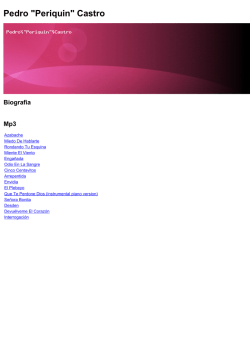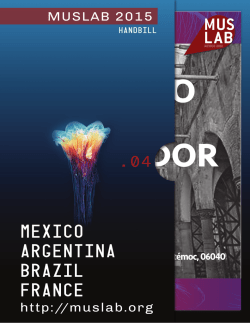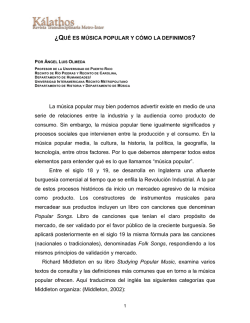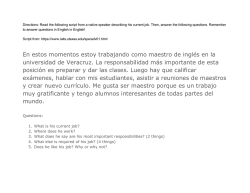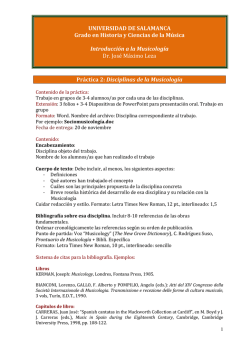
Program
MUSLAB.ORG MUS L AB ESPACIO SONORO UAM XOCHIMILCO Concierto de Clausura 15 de Diciembre Calzada del Hueso 1100, Col. Villa Quietud, Delegación Coyoacán, C.P. 04960, México D.F. MU SLAB 2015 E S PA C I O S O N O R O - U A M -X MUS L AB Juan María Solare Composer & pianist Juan María Solare (Buenos Aires, 1966), an Argentine living in Germany, is one of those musicians that open scarcely travelled paths. The originality of his music stems from the confluence between post-Piazzollian tango and classical contemporary music. His singular style represents a synthesis of North and South, classical and popular, wit and melancholy, performance and composition. “Art music and light music are not irreconcilable extremes, but poles in a force field”, says Solare about his “musical bilingualism”. Composition degrees at the IUNA (Instituto Universitario Nacional del Arte), Buenos Aires and at the Hochschule für Musik Köln (with Fritsch, Barlow, Humpert, Kagel). Studies in Stuttgart with Helmut Lachenmann. Regular assistant to the composition courses of Karlheinz Stockhausen in Kürten, Germany. “A full-blooded musician.” (Hans-Joachim Brandt, Wümme Zeitung, Lilienthal) “A rare spirit” (Karlheinz Stockhausen). His electroacustic music is included in experimental shortfilms (“Bipolar”, “Verformung von Metallkristallen”) and was awarded first prize at the competition of the Federación Argentina de Música Electroacústica (2005). He has given piano recitals in Buenos Aires and dozens of Argentinean cities, plus Berlin, Istanbul, Finland, Denmark, Amsterdam, Madrid, Graz, Geneva, Seville, London... The audience at his concerts is fascinated by his warmth and quality. Solare conducts the Orquesta no Típica at the university of Bremen (Germany). At the Hochschule für Künste in Bremen he teaches Composition and Arrangements. He also conducts the Jacobs Chamber Orchestra at the Jacobs University Bremen and the symphony orchestra of the Bremer Orchestergemeinschaft. As a pianist with over 400 concerts on his account, he has participated at the World Tango Summit on three occasions. He is the editor of four tango albums for the publishing house Ricordi Munich. Composition prizes in Argentina, Germany, United Kingdom, Austria and Spain. Twelve CDs by different performers include at least one piece by Juan María Solare. Not all who wander are lost “Not all who wander are lost” was composed in Bremen (Germany), in the composer’s studio, in September 2014. The software used to generate sounds was mainly the virtual synthesizer Cognosphere, by Hollow Sun and Mario Kruselj (a synthesizer especialised in advanced retro sounds, generated through samples of 40s and 50s valve test oscillators). There are melodic elements in this piece (melody in the sense of a succesion of pitches and intervals), with motifs from 1 to 5 components. MU SLAB 2015 E S PA C I O S O N O R O - U A M -X Jorge Antunes MUS L AB Nació en 1942, en Rio de Janeiro, donde realizó su formación musical tradicional. Estudió también Física. En 1961 inició sus primeiras experiencias con música electrónica y desde entonces és reconocido como el precursor de este genero en Brasil. En 1965 empezó a investigar la correspondencia entre sonidos y colores componiendo una série de trabajos a que dió el nombre de Cromoplastofonias, para orquestas, cintas magnéticas, luzes, usando tambiém los sentidos del olfato, del paladar y del tacto. Entre 1969 y 1973 vivió en el exterior realizando estudios pós-graduados en Buenos Aires, Utrecht y Paris. En este período estudió con Ginastera, Luis de Pablo, Umberto Eco, Gandini, König, Tempelars, Schaeffer y Bayle. En la Universidad de Paris VIII terminó su doctorado en estética musical teniendo Daniel Charles como director. Ganó vários premios internacionales de composición. Desde 1973 Antunes és profesor de la Universidad de Brasília, donde fundó el GeMUnB (Grupo de Experimentação Musical). En 1994 Antunes fué electo miembro de la Academia Brasilera de Música. En los últimos años tiene recebido vários encargos de orquestas, rádios y festivales. Sus partituras están publicadas por Salabert, Breitkopf&Hartell, Suvini Zerboni, Zimmermann, Ricordi, Sistrum y Billaudot. Carta Athenagórica De Sor Juana Fue compuesta en el CMMAS (Centro Mexicano de Música y Artes Sonoras) en agosto/septiembre de 2013, durante la estancia de Jorge Antunes en Morelia, gracias a un premio de Ibermúsicas. En esta obra Antunes continúa su búsqueda de una “Música Figurativa”, trabajando previamente la estructura musical y los objetos musicales, basados en la retórica de los poetas que utilizan figuras de lenguaje. Aquí el compositor utiliza el quiasmo, también llamado retruécano, a partir de poemas de Sor Juana Inés de la Cruz. “Carta Athenagórica” és el nombre dado a la famosa y polémica carta escrita por Sor Juana en noviembre de 1690, en el convento de Santa Paula de la Orden de San Jerónimo, en la Ciudad de México, a petición del obispo Manuel Fernández de Santa Cruz. Athenagórica significa “digna de la sabiduría de Atenea”. La carta es una crítica al sermón de Mandato del portugués António Vieira sobre las finezas de Cristo. Sin embargo, es definida como un escrito lleno de “ardientes declaraciones feministas”. MU SLAB 2015 E S PA C I O S O N O R O - U A M -X Eric Lyon MUS L AB Eric Lyon is a composer and computer music researcher. His work focuses on articulated noise, spatial orchestration and computer chamber music. His software includes FFTease and LyonPotpourri, collections of audio objects written for Max/MSP and Pd. He is the author of “Designing Audio Objects for Max/MSP and Pd”, which explicates the process of designing and implementing audio DSP externals. In 2011, Lyon was awarded a Giga-Hertz prize from ZKM, resulting in the creation of the 43-channel computer music composition Spirits. His 124-channel composition “The Cascades” was premiered in the Cube at the Virginia Tech Center for the Arts, and recently presented on the BEAST system at BEAST FEaST in Birmingham. He has composed for such artists as The Biomuse Trio, Margaret Lancaster, The Noise Quartet, Ensemble mise-en, String Noise, The Crash Ensemble, Esther Lamneck, Kathleen Supové, and Marianne Gythfeldt. Lyon has taught computer music at Keio University, IAMAS, Dartmouth College, Manchester University, and Queen’s University Belfast. Currently, he teaches in the School of Performing Arts at Virginia Tech, and is a faculty fellow at the Institute for Creativity, Arts, and Technology. Spaced Images with Noise and Lines Spaced Images with Noise and Lines (2011) was composed for the Spatial Music Collective, and premiered at the Joinery in Dublin. The work employs an image to spatialization algorithm I developed in collaboration with Shawn Greenlee. An image may be considered as a series of lines from top to bottom. Each pixel in a line corresponds to a virtual location on the perimeter of an eight-channel speaker surround configuration. Each line is virtually wrapped around the audience, and the image itself is best conceived as a cylinder. Scanning down the image activates the spatial distribution algorithm. The spatial image sources were all created by the composer using freeware image program The Gimp. The images consist of a combination of noise generated by The Gimp’s noise algorithms, and lines drawn into the image. Various image processing filters were applied, in order to modulate the intended spatial effects. Since each pixel is interpreted as an amplitude to be applied to a sound, the spatial algorithm is tightly coupled to the sound-generation process. MU SLAB 2015 E S PA C I O S O N O R O - U A M -X Damián MUS L AB Gorandi Damián Gorandi born in 1991 Buenos Aires, Argentina. He was honored at the Latin American sound art contest “Las soledades" organized by the Cultural Center of Spain Córdoba. He was also honored at the “2do concurso internacional arte-Clima” organized by “CEIArtE – UNTREF” . His Works Have been selected in many Festival like " Nuevas Musicas por la memoria IV and V edition” (Argentina) ,Fundacion Destellos ( Argentina), “Nycemf”New York City Electroacoustic Music (EE.UU.) , MusInfo Festival Art & Science Days 2015 (Francia) , “Ex -nihilo” (Mexico). His Work was declared “ artistic and cultural interest” by the Argentine´s Ministry of culture. . He is member of the Laboratory of Electroacoustic Music Conservatory " Alberto Ginastera " and member of the ensemble of Real Time Composition directed by Jorge Sad. He Is currently studying Acusmatic Composition with Elsa Justel. De albures, chistes y entresueÑos The work is permeated by the idea that objects have hidden , another meaning , so, a sound masking as a "albur" of '' other sound'' repressed. Perhaps a -metaSound that possesses a strong aesthetic charge. This piece through Continents unstable and wandering permeable to the unexpected and Dionysian , where the unconscious is expressed. ( ¨ ... Just a perception withdraw from the surface consciousness to the unconscious mind to take advantage irrational expression¨ ) ( Anton Ehrenweing ) MU SLAB 2015 E S PA C I O S O N O R O - U A M -X Daniel Osorio MUS L AB Nace en Santiago de Chile. Inicia sus estudios de música en 1987 con Jaime Calisto (guitarra clásica), y luego ingresa a la Facultad de Artes de la Universidad de Chile (Licenciatura en Composición) donde estudia con el compositor Pablo Aranda y también estudia Música Electroacústica con Edgardo Cantón y Rolando Cori. Desarrolla su tesis de grado en torno a la temática de la desaparición de la comunidad yámana y su idioma (“Iax-aus”), y cuyo registro fonográfico fue incluido en el disco “Iax-Aus-Káitek” (2004), trabajo discográfico realizado en conjunto con el compositor Antonio Carvallo. También edita junto a Antonio Carvallo y la Facultad de Artes (Universidad de Chile) la publicación “Partituras...” (2001) que contiene obras de ambos compuestas desde el año 1998 hasta el 2000. Para proseguir sus estudios de postgrado viaja en el año 2005 a Saarbrücken, Alemania, becado por el Gobierno de Chile (Beca Presidente de la República - MIDEPLAN), y donde estudia Composición con Theo Brandmüller y Stefan Litwin, y música electrónica con Stefan Zintel en la Hochschule für Musik Saar (Master in Komposition). También fue becado por el “Internationale Musikinstitut Darmstadt” para participar en los “Internationalen Ferienkurse für Neue Musik Darmstadt (Alemania)”. Durante el año 2012 es contactado por la Comunidad Electroacústica de Chile para participar como compositor invitado en el Festival de Música Electroacústica “Aimaako” 2012. Allí da conciertos (“Mano a Mano”) y charlas en la Universidad de Valparaíso y Universidad ARCIS. Spiegelung „Spiegelung” (Trad. Imagen en el espejo) es una obra que fue encargada para el proyecto en DVD „Largo Sguardo“. La obra se basó en el texto de Stefano Amorese („Specchiatura“) y posteriormente llegó a ser parte del video del artista visual Horkay Istvàn. „Spiegelung“ en una pieza acusmática que fue compuesta para surround 5.1 a partir de las grabaciones de la soprano Franziska Erdmann y del narrador Jens Alles, a lo que se agregó el procesamiento digital de diferentes fuentes sonoras, también grabadas para la obra. La complejidad y extensión del texto permitió generar diferentes perspectivas sonoras a través de determinadas formas de síntesis sonoras, que no obstante, se subordinan al ritmo y densidad sonora del texto hablado (alemán). MU SLAB 2015 E S PA C I O S O N O R O - U A M -X MUS L AB Dimitris Maronidis Dimitris Maronidis (b.1980) composes acoustic, electroacoustic, mixed media and interactive music. In his most recent works he tries to bring together these fields and he explores extensively algorithmic processes for organizing his musical material. Dimitris has studied Counterpoint, Orchestration and Composition at the State Conservatory of Thessaloniki and Aristotle University of Thessaloniki. In 2009 he completed his PhD in Music Composition at the University of York, with financial support granted by the State Scholarships Foundation of Greece. In 2011 he moved to United States of America and pursued a post-doc research as a visiting Fulbright scholar at Harvard University. He has also studied computer music at the Institute of Psychoacoustics (IPSA) in an experimental project held at the Aristotle University in collaboration with the American Hellenic Educational Progressive Association (AHEPA). There he was introduced to the techniques of computer assisted composition (CAC) and electronic music. Illumination Electronique II His works have been performed in many places and festivals around the world by decent ensembles and orchestras (Lorraine Symphony Orchestra (FR), State Orchestra of Thessaloniki (GR), State Orchestra of Athens (GR), Nieuw Ensemble (NL), dissonArt ensemble (GR), ContraTempo Chamber Orchestra (GR), Diotima Quartet (FR), Chimera Ensemble (UK), UMS ‘n JIP (CH) etc) He has lectured in composition, music theory and orchestration classes at the Aristotle University of Thessaloniki and State Conservatory of Thessaloniki. He is currently teaching Electronic Music courses at the Aristotle University of Thessaloniki. The piece was composed using Frequency Modulation techniques. The pitch structure is based on the triad A - F# - F. Various time and spectral manipulations are utilized during the piece leading to new forms. MU SLAB 2015 E S PA C I O S O N O R O - U A M -X MUS L AB Damián Jorge Ratto Nacido en 1981 en Ciudad de Buenos Aires (Argentina), licenciado en composición de la Universidad Católica Argentina, realizó sus estudios de instrumento en el Instituto Universitario Nacional de Artes (actualmente Universidad Nacional de Artes). Ha tenido entre sus profesores de composición a Marcelo Delgado, Marta Lambertini y Juan Ortiz de Zárate. Como intérprete realiza frecuentes estrenos de obras de compositores argentinos, música para medios mixtos e improvisaciones de distinto tipo. Es miembro de la asociación de compositores Ars Contemporánea. Nollendorfplatz in the dark El título y la propuesta de la obra son un guiño a la composición de Charles Ives (1874-1974) Central Park in the dark, que plantea un recorrido nocturno por el parque de Nueva York. Nollendorfplatz no es estrictamente una plaza, sino una pequeña zona en el barrio de Schöneberg en Berlín que contiene una importante terminal de trenes y algunos célebres sitios de la antigua ciudad. MU SLAB 2015 E S PA C I O S O N O R O - U A M -X Jorge Sad Levi MUS L AB Jorge Sad Levi nació en Buenos Aires en 1959. Recibió algunas distinciones nacionales e internacionales entre las que se destacan el premio en el Concurso Internacional de Composición Xicoatl, Salzburgo, 2009 , el 1er Premio Ciudad de Buenos Aires , el 1er Premio Juan Carlos Paz en dos oportunidades y numerosísimas menciones en concursos internacionales. Fundó el Instituto de Investigación en Sonido y Música por Medios Digitales en 1998 . Produjo dos CD ¨Músicas de una Etnia Imaginaria¨ y ¨Retransmisión¨. Realizó obras en colaboración con la coreógrafa y artista multimedia Margarita Bali Zoom in Look Out y Pizzurno Pixelado. , Fundó en 2011 el Festival Nuevas Músicas por la Memoria, que llega a su sexta edición. Su música fue abordada por numerosos intérpretes de renombre como Josetxo Silguero, David Nuñez , Guille Lavado , Elena Buchbinder , Javier Bravo , Linda Wetherill entre muchos otros. Recibió encargos del GRM (París) , Musiques & Recherches (Ohain) , Ciclo de Música Contemporánea del Teatro San Martín , Centro Cultural Rojas, Ministerio de Cultura argentino. Actualmente Dirige el Ensamble Aula 19 , es Prof. de Composición en el Conservatorio Ginastera ,de Semiología Musical en Untref y de Diseño de Bandas Sonoras en la ENERC. Mi casa es la lluvia Mi casa es la lluvia es una pieza autobiográfica. Mi casa es la lluvia , es también una exploración sobre mi voz. Mi voz como material que aparece y a la vez se desvanece acusmatizado y ocultado por los materiales sintéticos, mi voz que tiembla y oscila. Mi voz oculta por el ruido. Mi voz que cala, como la lluvia, hasta los huesos. En cada ciudad hay una misma lluvia que une y divide. Que acerca y aleja, Que une y disuelve las identidades. Las palabras que marcan el final, fueron grabadas en la Rue Ontario, durante una de esas memorables lluvias de verano en Montreal, en las que el tamaño de las gotas y el aire liberado abrían paso a la ensoñación de los espacios internos y externos de una ciudad amada. MU SLAB 2015 MUSLAB.ORG MUS L AB Diseño: Miguel Arturo Reyes Año: 2015
© Copyright 2026
